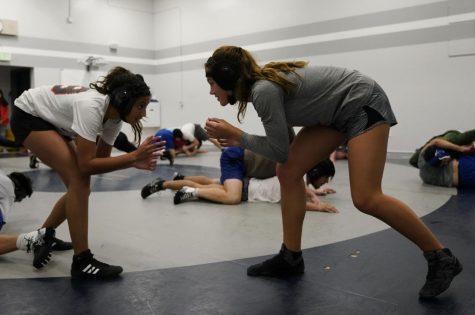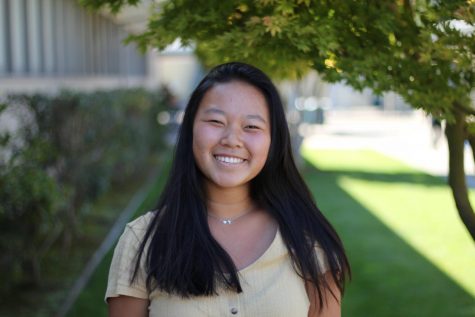Wrestling smacks down gender stereotypes
December 15, 2018

Freshmen Pari Mohan, left, and Ava Halkola, right, assume wrestling stance, preparing for their next meet in January. As the only girls on the team, they hope to set an example for other girls who are interested in joining.
Wrestling is a man’s sport. Girls can’t fight—they’re weak and fragile. If they do contact sports, they must be more masculine. Many of these stereotypes are used to define females in the world of contact sports. However, these generalizations about women in wrestling haven’t stopped freshmen Ava Halkola and Pari Mohan, members of the Los Altos wrestling team.
The girls did not start wrestling to combat these stereotypes, however. The reason was much simpler. Wanting to try a new sport in the winter, Pari decided to join the wrestling team.
“It was the only [winter sport] that was non-cut, and it seemed like a pretty cool sport, actually,” Pari said. “It seems kind of unique, too, [because] no one really does it, and it looks good for colleges.”
The girls didn’t know what to expect from the sport, but once Pari convinced Ava to join the team with her, they both realized they really enjoyed it.
“I think it was a bigger commitment than I thought I was making,” Ava said. “But I think [I’ve] come [to] enjoy it more than I thought I would. [Sometimes] people think that I’m more masculine than all the other girls that are doing like soccer or other ‘girly’ sports, but I don’t really think about it that much. Before, I just thought girl wrestlers were really strong and that’s something that I want to be.”
Without previous experience with wrestling, it took a few days for the girls to adjust to the team’s strenuous drills and exercises. During practices, from 3:45 to 6 p.m., wrestlers run two to three miles, do sprints and other exercises such as pushups. The girls practice wrestling outside of school as well.
“When I go home, I usually think about homework,” Ava said. “After that, I’m thinking about [new] moves and going on late night runs and trying to get better as a wrestler, taking time out of my own day to practice.”
After joining the team, the girls perceive wrestling in a new light. They realized it wasn’t something that only specific girls could do, but something everyone could do, no matter their body shape and size. Unlike what some may believe, the girls are treated as equals on the co-ed team. They do the same drills, workouts and are expected to put in the same amount of effort as the boys.
“Sometimes the coaches have slightly lower expectations with them,” sophomore Sam Nath said. “That’s more just based on their experience level. The whole team dynamic is different than it would be with a whole boys team, but I don’t think that’s a bad thing.”
As long as their weights and skill levels are around the same, the girls and boys are permitted to wrestle each other. In a previous scrimmage, instead of being divided by gender, wrestlers were divided by skill level.
“When I was in water polo, we [would] always look at the guys and say [that] they have an advantage,” Pari said. “But now that I’m wrestling guys, I can’t say that the guy has an advantage over me. I just have to go into it thinking that they’re an equal.”
According to the girls, they are treated like “one of the guys” rather than outcasts. The boys consider the presence of girls on the team normal.
“The past schools I’ve been at had girls on [their wrestling teams],” senior Kenneth Galsgaard said. “These girls are amazing wrestlers. I have a friend in Washington who won nationals this year, and she’s a junior. I think it’s great that girls are wrestling. There’s not too much about it. It’s nothing new or nothing abnormal.”
Wrestling is becoming a part of Ava and Pari’s everyday life, too. As they gain more experience, they also gain more appreciation for the sport.
“To me, wrestling is one of those types of creative sports. You could have your own style of wrestling and still fit the rules,” Ava said. “It’s more about you as an individual than as a team.”
As they get better and learn more about the sport, the girls are starting feeling more confident in their skills as wrestlers and as people.
“I’m doing this thing that not many other girls do, or not many other people do,” Pari said. “That’s really cool, and [I’m] proud of [myself].”





